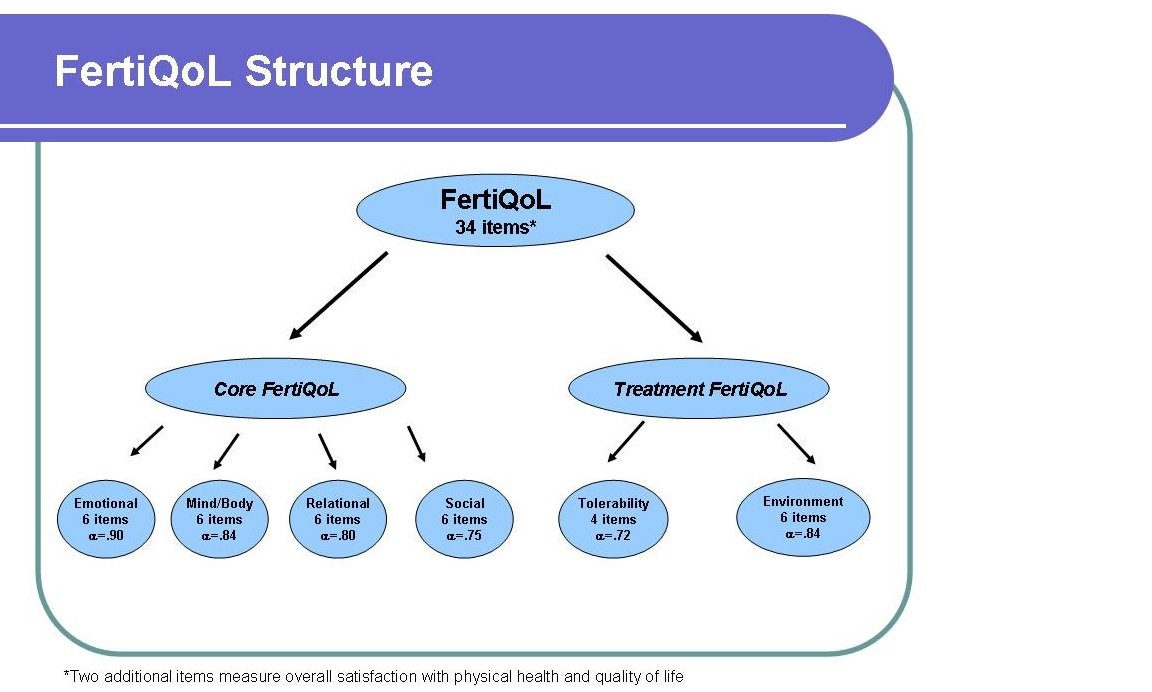Relevant population
FertiQoL is relevant for anyone who feels they are experiencing fertility problems. People who do not currently have a partner can leave blank items about marriage or partnership. The optional FertiQoL Treatment module is relevant to people who have used fertility medical services (which includes any medical consultation or intervention).
Time frame
Responses to items are given according to ‘current thoughts and feelings’.
It takes about 10-15 minutes to complete FertiQoL.
Instructions & response scales
FertiQoL instructions:
“For each question, kindly check (tick the box) for the response that most closely reflects how you think and feel. Relate your answers to your current thoughts and feelings. Some questions may relate to your private life, but they are necessary to adequately measure all aspects of your life. Please complete the items marked with an asterisk (*) only if you have a partner.”
Structure of FertiQoL
The FertiQoL is organised in the following way:
Overall physical health and quality of life satisfaction: Two single items capture an overall evaluation of physical health (“How would you rate your health”) and satisfaction with quality of life (“Are you satisfied with your quality of life”). These two items provide the background health and life satisfaction context for the evaluation of fertility quality of life. The remaining 34 items are structured as a core section related to personal and interpersonal quality of life (“Core FertiQol“) and an optional section related to treatment quality of life (“Treatment FertiQol“):
Core FertiQol: A total of 12 items assesses the impact of fertility problems in the emotional (6 items) and mind-body (6 items) domains. The Emotional subscale assesses the extent to which the individual experiences negative emotions associated with the experience of fertility problems (e.g., jealousy & resentment, sadness, depression). The Mind-Body subscale assesses to what extent the individual experiences negative physical symptoms (e.g., fatigue, pain) and cognitive or behavioral disruptions (e.g., poor concentration, disrupted daily activities, delayed life plans) as a result of the infertility. A further 12 items assesses the impact of fertility problems in the relational (6 items) and social (6 items) domains. The Relational subscale assesses the extent to which components (e.g., sexuality, communication, commitment) of the marital relationship or partnership have been affected by fertility problems. The Social subscale measures the extent to which social interactions have been affected by fertility problems (e.g., social inclusion, expectations, stigma, support).
Treatment FertiQol: Ten items assess quality of life during treatment, which includes any medical intervention or consultation, according to treatment environment (6 items) and treatment tolerability (4 items). The Treatment Environment subscale assesses accessibility and quality of treatment and interactions with medial staff. The Treatment Tolerability subscale assesses the experience of mental and physical symptoms and disruption in daily life due to treatment.
The FertiQoL subscale and total scale structure is:

FertiQoL is available in more than 30 languages – Click here to download

